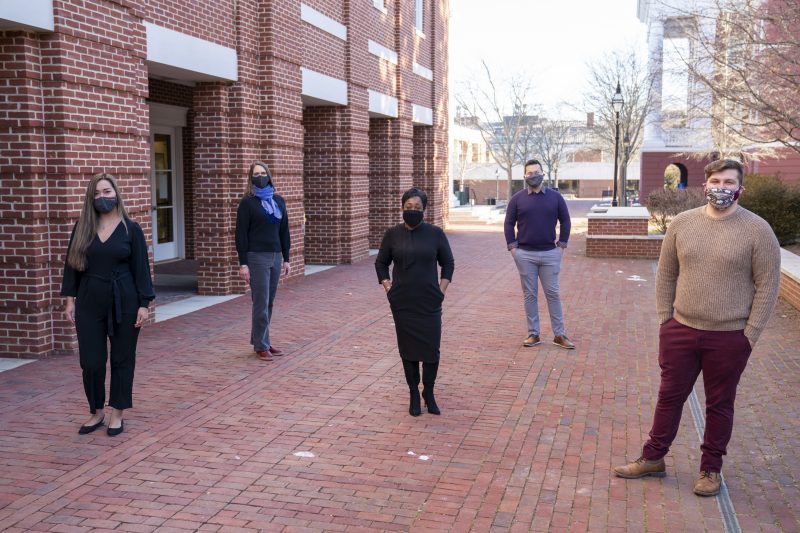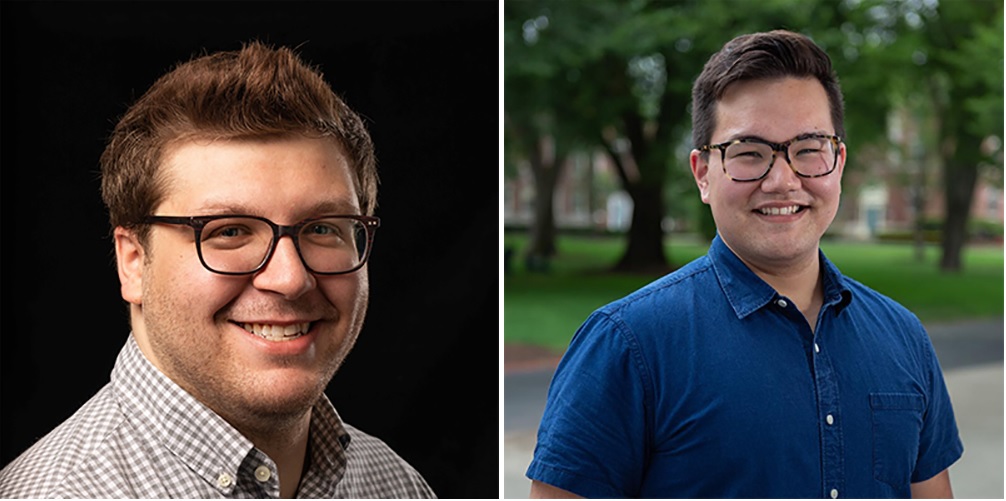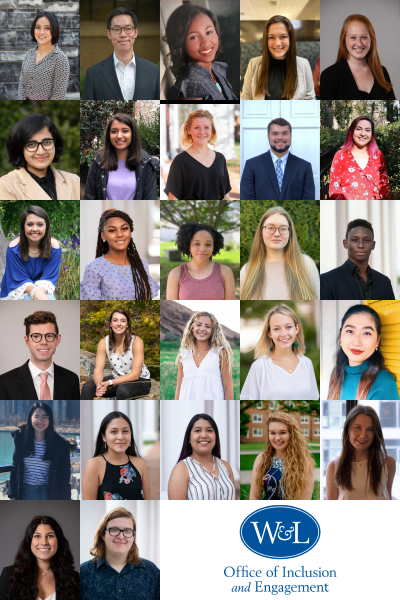A Center for Positive Change W&L’s Office of Inclusion and Engagement is expanding, reaching an unprecedented number of people with its programming.
Inside Washington and Lee University’s Office of Inclusion and Engagement, no two days are alike. Monday might mean diversity training for employees and meetings about campus climate. Tuesday might bring discussions with student leaders and negotiating contracts with nationally known speakers. Collectively, OIE’s five full-time staff work with hundreds of students, including the leaders of over 20 student organizations and six work-study interns, to make W&L’s environment more inclusive. They educate the community, support community members and provide programming and training.
It’s a big job.
“Creating inclusivity means fostering a culture in which all members of the community feel fully welcome and able to participate in everything Washington and Lee has to offer,” said Tammy Futrell, dean for diversity, inclusion and student engagement and the head of the office. “That sounds pretty simple, but when you’re talking about achieving that for over 1,800 students, it’s quite an aspiration.”
Futrell usually spends 12 or 13 hours a day in the office, five days a week and most weekends. COVID-19 restrictions have let her balance that load with some work from home, swapping office heels for fuzzy socks and savoring the smell of her slow cooker during Zoom meetings, but she and her staff have been as busy as ever.
“I was on the provost search committee,” she said. “We’re designing a new center. There are student meetings and programs in the evening and weekends — I try to go to as many student organization programs as I possibly can.”
To help Futrell and Maggie Shapiro Haskett, W&L’s director of Jewish life, W&L’s most recent Strategic Plan called for new hires. Last month Fiorela Giraldo Prado de Lewis joined the office as program coordinator for the OIE and the Johnson Program. And last September, the university brought on Jake Reeves and Dani Roberts, who previously worked in diversity and inclusion at Old Dominion University and Wheaton College, respectively, as assistant directors of inclusion and engagement.
Reeves and Roberts started during the campus-wide shift to virtual programming, and their first semester went better than they expected under the circumstances, thanks to the students they work with.
“It’s not been a difficult transition,” Reeves said. “We have a strong group of students who are invested in the programming. I think if we didn’t, it would look different.”
The members of the OIE are effusive in praising the students they work with. Shapiro Haskett credits them with W&L Hillel’s surprising first-place finish in the nationwide Motivote campaign this fall. Reeves says the success of LGBTQ+ programming comes from the work of the student Queer Liberation Alliance. Roberts raves about the OIE Ambassadors, students who offer their own programming on diversity and inclusion, including a successful series of Communi-Teas — coffee-shop-style discussions on a topic of two students’ choosing.
“Our students are probably some of the greatest leaders in the country,” Futrell said. “They love the sense of autonomy when it comes to programming, and I think that piece is so critical. If there’s not student buy-in, it falls flat.”
Given the difficulties facing higher education during the pandemic, OIE staff weren’t expecting a string of successes during Fall Term, but they and their student leaders pulled them off anyway. Hillel put together a DIY Shabbat program for at-home shabbat dinners that proved a hit. October’s Pride Week festivities were anchored by a Q&A with the actress, comedian and radio host Fortune Feimster, who is popular among LGBTQ+ students. The OIE Ambassadors led a series of virtual chats on topics like burnout and mental health. The largest virtual programs brought together over 500 participants at once.
“I don’t think anybody anticipated that there was going to be good news coming out of anywhere,” Shapiro Haskett said. “But there is, from so many different corners.”
The OIE was not immune from the semester’s broader challenges. Virtual learning created difficulties for students who stayed at home and studied remotely, and first-year students had a disrupted experience. The impact of COVID-19 and racial injustice on students, as well as W&L’s discussions about its name and campus climate, created additional stress as well.
“Those things have an impact,” Futrell said. “But regardless of the overall environment, you know, we still have a community to build and maintain. Our mission and our roles don’t change. We have an obligation and a responsibility, a mission and a passion, to make sure that the university is an inclusive environment, that we’re educating our community and that we’re supporting the community members and providing programming and training. Even during a crisis, we still go on, business as usual.”
Shapiro Haskett, who has been at W&L since 2017, added, “It’s been heartening to see the appetite for difficult conversations. Underlying all of that is, I think, a real commitment to the W&L community. Certainly, there are differences of opinion. But it wouldn’t matter so much if the community didn’t matter. People want to show up and do the hard work of being in community, even when we disagree.”
The future will be busy for the OIE. Reeves and Roberts are excited about the programming they have in store, made possible by generous alumni donations like the Class of 1994’s 25th reunion gift and the recently established George Floyd Endowment. And after the outpouring of grief and anger over racial injustice this summer, many alumni are contacting the office to ask how they can help.
In one of the earliest projects arising from W&L’s latest Strategic Plan, the OIE will also receive a new physical location in Elrod Commons at the heart of campus, which will bring together resources currently spread across three floors and provide space for larger student group meetings and training.
The OIE aspires to make it “a central hub of diverse conversation, inclusive feelings and welcoming opportunities,” Roberts said — a home where every student can prepare for the engaged citizenship in a global and diverse society that W&L’s mission statement calls for. “This will truly become an inclusive space for everyone to come to, for everyone to learn in, and everyone to be comfortable with the people that we work with, that we live with, that we socialize with.”
The work of inclusion, Futrell said, falls on the shoulders of every member of the community. But the new center, and the programming it will enable, will make it easier to share that load and do the work in fellowship. As alumni and parents help students feel warm and welcomed at events and meetings, as students and faculty make programs and organizations more inclusive, and as W&L continues to grow into the best possible version of itself, the OIE will be, for many, at the center of positive change.
 The members of W&L’s Office of Inclusion and Engagement. From l. to r.: Fiorela Giraldo Prado de Lewis, Maggie Shapiro Haskett, Tammy Futrell, Dani Roberts, Jake Reeves
The members of W&L’s Office of Inclusion and Engagement. From l. to r.: Fiorela Giraldo Prado de Lewis, Maggie Shapiro Haskett, Tammy Futrell, Dani Roberts, Jake Reeves Assistant directors of inclusion and engagement Jake Reeves (l.) and Dani Roberts joined the OIE in September 2020.
Assistant directors of inclusion and engagement Jake Reeves (l.) and Dani Roberts joined the OIE in September 2020. The 2020–2021 OIE Ambassadors offer their own programming on diversity and inclusion.
The 2020–2021 OIE Ambassadors offer their own programming on diversity and inclusion.
You must be logged in to post a comment.